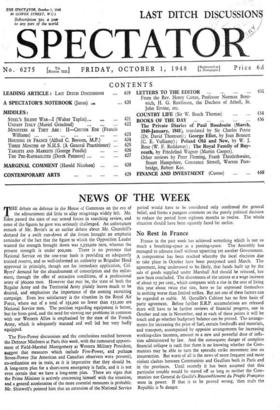NEWS OF THE WEEK
THE debate on defence in the House of Commons on the eve of the adjournment did little to allay misgivings widely felt. Mr. Eden passed the state of our armed forces in searching review, and none of the figures he gave was seriously challenged. An unfortunate remark of Mr. Bevin's in an earlier debate about Mr. Churchill's demand for a swift run-down of the forces brought an emphatic reminder of the fact that the figure to which the Opposition Leader wanted the strength brought down was 1,550,000 men, whereas the present strength is under 90o,000. There is no pretence that National Service on the one-year basis is providing an adequately trained reserve, and so well-informed an authority as Brigadier Head approved in principle, though not for immediate application, Col. Byers' demand for the abandonment of conscription and the enlist- ment, through the offer of attractive conditions, of a professional army of 360,000 men. However that may be, the state of both the Regular Army and the Territorial Army plainly leaves much to be desired, and emphasises the importance of the coming recruiting campaign. Even less satisfactory is the situation in the Royal Air Force, where out of a total of 231,000 no fewer than 131,000 are National Service men. The position regarding equipment is better, but far from good, and the need for viewing our problems in common with our Western Allies is emphasised by the state of the French Army, which is adequately manned and well led but very badly equipped.
The Five-Power discussions and the conclusions reached between the Defence Ministers at Paris this week, with the rumoured appoint- ment of Field-Marshal Montgomery as Western Military President, suggest that measures which include Five-Power, and perhaps Seven-Power (for American and Canadian observers were present), co-ordination are in train, as it is imperative that they should be. A long-term plan for a short-term emergency is futile, and it is not even certain that we have a long-term plan. There are signs that the Prime Minister is actively concerning himself with the situation, and a general acceleration of the more essential measures is probable. Mr. Shinwell's pointed hint that an extension of the National Service period would have to be considered only confirmed the general belief, and forms a pungent comment on the purely political decision to reduce the period from eighteen months to twelve. The whole situation should have been squarely faced far earlier.


































